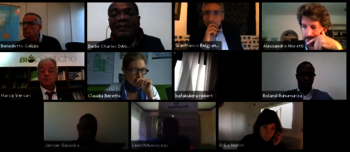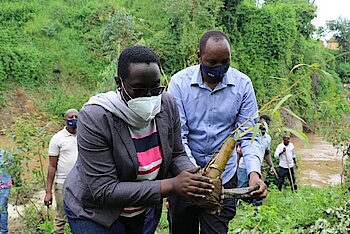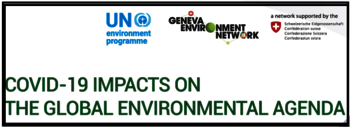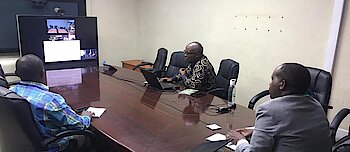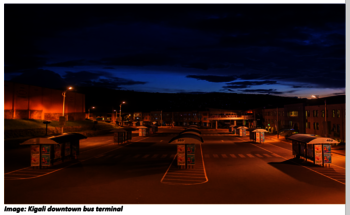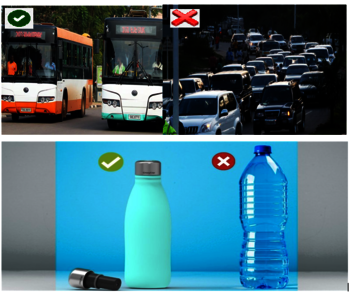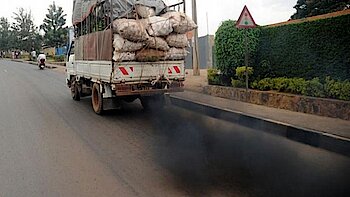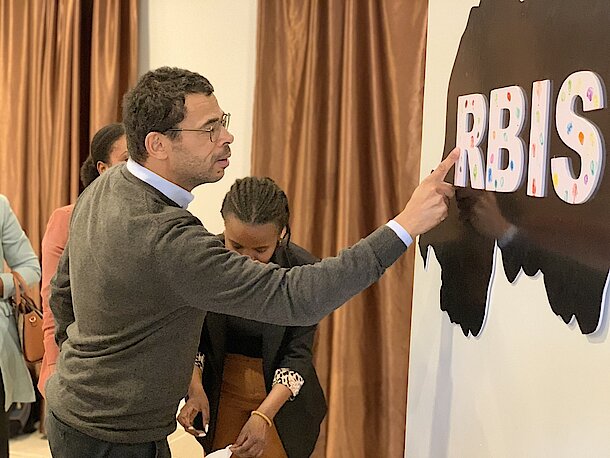
The Rwanda Biodiversity Information System to Drive Climate Change Adaptation and Conservation was launched
The Center of Excellence in Biodiversity and Natural Resource Management at the University of Rwanda has launched the Rwanda Biodiversity Information System (RBIS), a ground-breaking online portal that provides access to biodiversity data for monitoring, decision-making, reporting, research, planning, and conservation efforts in Rwanda.
The Biodiversity Information System is a one-stop-shop for all available biodiversity data and spatial layers (a type of data layer used in geographic information systems that enables visualization of information) related to climate, geology, species distributions and conservation status, ecosystems, land use and land cover that has been sourced from local and international data providers.
"The RBIS is a crucial tool for making data accessible to decision-makers and researchers who need it most. This information will help us better understand and manage our natural resources and protect Rwanda’s rich biodiversity," said Prof. Beth Kaplin, Director of the Center of Excellence in Biodiversity and Natural Resource Management.
The Rwanda Biodiversity Information System or RBIS allows users to access digitised, cleaned, and standardised biodiversity, physico-chemical and meteorological data and is expected to contribute to policies, strategies, monitoring of targets, reporting, and biodiversity conservation efforts in Rwanda.
The system will also inform land use planning and early detection of environmental change through biodiversity monitoring, assess nature-based solutions and green urbanisation interventions, and provide data to support natural capital accounting and payment for ecosystem services schemes, such as carbon credits. The RBIS will help Rwanda implement strategies and policies like the new Global Biodiversity Framework and Nationally Determined Contributions by providing a platform for monitoring restoration and climate adaptation interventions using biological indicators.
Speaking at the launch event, Juliet Kabera, Director General of the Rwanda Environment Management Authority, said: "The Rwanda Biodiversity Information System will enable policymakers and practitioners to make informed decisions and develop new environmental policies based on scientific evidence. This is critical to effectively manage our natural resources and achieve our ambitious climate action and resilience goals.
" The Rwanda Biodiversity Information System is accessible at rbis.ur.ac.rw and already has more than 127,000 records from birds, fish, plants, amphibians and reptiles to Odonates, macroinvertebrates and mammals, as well as over 26 spatial layers. The system also hosts 2 the first Spatial Biodiversity Assessment for Rwanda which the Center developed under the mentorship from South Africa National Biodiversity Institute and many experts in Rwanda. This assessment includes an ecosystem types map which enables identification and prioritization of critical ecosystems in the country.
The system was developed with financial support from the JRS Biodiversity Foundation and technical assistance from South Africa National Biodiversity Institute, Freshwater Research Centre, and Kartoza - a GIS service provider.
The Center of Excellence in Biodiversity and Natural Resource Management at the University of Rwanda led the development of the RBIS and will continue to maintain and develop the system in collaboration with the Ministry of Environment and other partners. The Center created a community of practice around biodiversity data management which continuously trains students and young researchers in data management, taxonomy, and applications of biodiversity data to Spatial Biodiversity Assessments.
The Rwanda Biodiversity Information System is a significant achievement that will contribute to biodiversity conservation and sustainable development efforts in Rwanda, and helps Rwanda meet its commitments to the Convention on Biological Diversity. Its user-friendly interface and open access features make it a valuable tool for researchers, decision-makers, and other stakeholders who are working towards ensuring the protection of Rwanda's natural resources and unique biodiversity.
Topics
More posts
Rwanda-Italy Investors and entrepreneurs discussed how to explore Green Investment opportunities
This webinar is the third virtual dialogue that gather the Rwandan and Italian entrepreneurs, investors and institutions for exploring the green…
Rwanda’s NAP Project funded by GEF was launched
The Global Environment Facility (GEF)-funded $6 million project “Building the capacity of Rwanda’s government to advance the National Adaptation…
Rwanda Pledges emissions cut of 38% in its climate action plan by 2030
Rwanda as a signatory to the Paris Agreement under which countries are due to update or communicate their 2030 emission-reduction plans, it submitted…
The Geneva Environment Dialogues discussed the impacts of the COVID-19 on the global climate change agenda
The dialogues took place on Tuesday 19 May, 2020 from 9: 00 to 9:50 on Facebook live, as way of communicating in this time of COVID-19.
this session…
Assessment of Rwanda’s vulnerability to climate change was presented to local authorities
Rwanda Environment Management Authority (REMA), with the logistical support of Ministry of Local Government (MINALOC), hold a video conference with…
Coronavirus responses proves the World can act on Climate Change
The COVID-19 pandemic has provoked a global response unlike anything we have seen before. Governments have witnessed transformational changes that…
COP 26 postponed due to the disruption caused by COVID-19
This crucial climate summit is the 26th session of conference of Parties (COP26) to the UNFCCC and it was scheduled from 9-19 November 2020 in…
Be self-accountable to tackle Climate Change and save environment
Climate change has already begun to impact our planet in more ways than we can think. Temperatures continue to rise throughout the planet and we are…
Switching to electric vehicles is a mean to reduce greenhouse gases emissions and improve air quality in the City of Kigali
Over the last 150 years, human activities have greatly contributed to the increase of greenhouse gases in the atmosphere, which make the planet…
